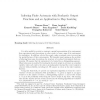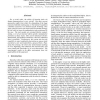425 search results - page 14 / 85 » Using Stochastic Grammars to Learn Robotic Tasks |
AAMAS
2010
Springer
13 years 8 months ago
2010
Springer
Abstract In this paper, we present a human-robot teaching framework that uses "virtual" games as a means for adapting a robot to its user through natural interaction in a...
AAAI
1992
13 years 9 months ago
1992
It is often useful for a robot to construct a spatial representation of its environment from experiments and observations, in other words, to learn a map of its environment by exp...
MVA
2007
13 years 10 months ago
2007
For a social robot, the ability of learning tasks via human demonstration is very crucial. But most current approaches suffer from either the demanding of the huge amount of label...
ICRA
2006
IEEE
14 years 2 months ago
2006
IEEE
— Many application tasks require the cooperation of two or more robots. Humans are good at cooperation in shared workspaces, because they anticipate and adapt to the intentions a...
GECCO
2004
Springer
14 years 2 months ago
2004
Springer
In this paper, we compare the performance of hierarchical GP methods (Automatically Defined Functions, Module Acquisition, Adaptive Representation through Learning) with the canon...


